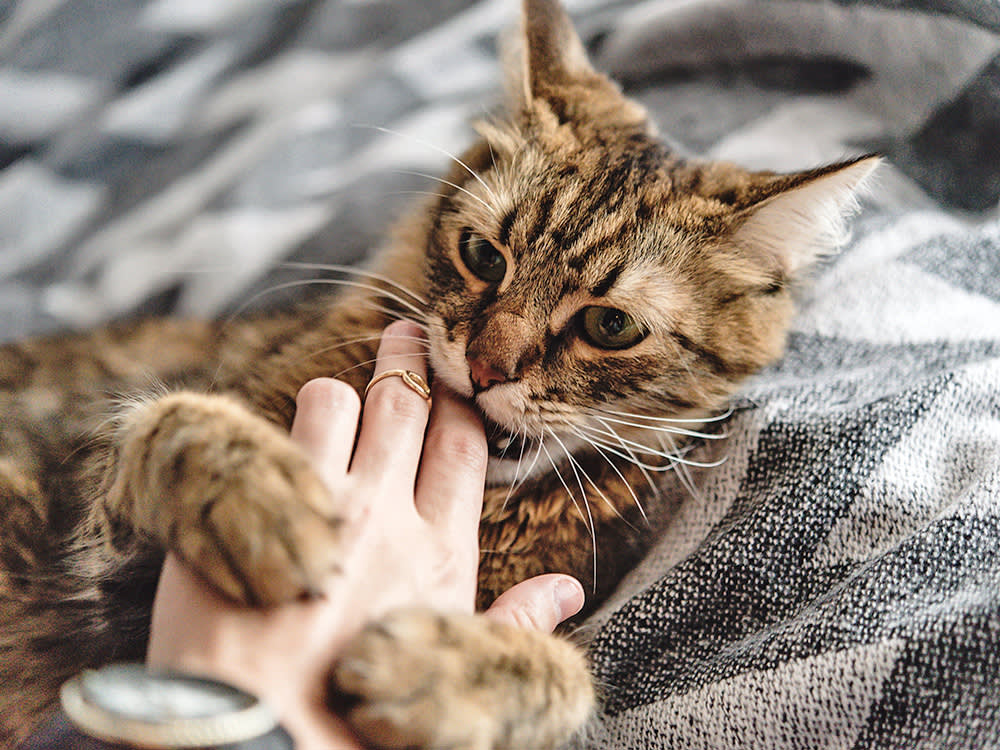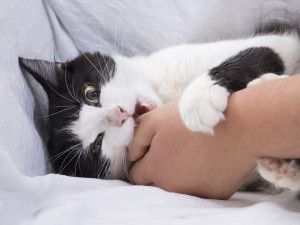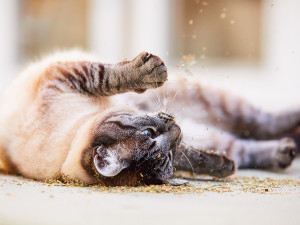Expert-Approved Tips and Tricks to Stop a Cat From Biting
Follow these tips when those nibbles start getting out of hand.

Share Article
In This Article:
Can You Train a Cat Not to Bite? Why Do Cats Bite? How to Tell if Your Cat Is About to Bite How to Stop Your Cat From Biting Training Techniques to Get Your Cat to Stop Biting How to React When Your Cat Bites You What to Do When Your Cat Has Bitten You
Cats are natural hunters, and biting is a part of that. Domesticated cats use biting to communicate their feelings or needs, so it is important for their humans to understand what they mean when they bite.
This could happen during play, such as a love bite to show affection, or it may be a sign of anxiety or aggression. Although this is an instinct that cats have, there are still ways to help curb their biting behavior.
Main takeaways
Cats bite as a way to communicate their feelings.
Kittens bite as a way to explore their surroundings.
Once you know when your cat will bite, you can begin to stop your cat from biting.
Positive reinforcement and clicker training are just two ways to help train your cat to not bite.
Do not reinforce the behavior when your cat bites you.
If a cat bites you, you should immediately seek medical attention.
Can you train a cat to not to bite?
There are many ways to stop a cat from biting. Feline behavioralist and feeding coach, Jennifer Van de Kieftopens in new tab says that knowing what your cat needs is the first step. “Meeting your cat’s needs is always the best way. So if your cat is biting because they are being playful, schedule a play session before that occurs. Cats who bite frequently may need to be trained not to bite.”

That’s right — although biting is part of a cat’s instincts, there are ways to curb this behavior. If training at home doesn’t work, you may need to see your veterinarian or a cat behavioralist.
Why do cats bite?
“Cats bite for many reasons,” Van de Kieft says. “Some include attention seeking, boredom, affection, hunger, frustration — and some just need to bite something.”
Why do kittens bite?
Kittens bite for many of the same reasons that cats do, but they also do it because they are young and exploring the world. Some of those reasons can include teething, indulging their curiosities, and playing. “Kittens who are teething need appropriate outlets for biting, such as chew toys,” Van de Kieft says.
How to tell if your cat is about to bite
There are many signs a cat is about to bite. “It depends on the cat,” Van de Kieft notes. “But a cat approaching you, getting close, and leaning their head towards you could be an indication. If a cat is being playful, they might run towards you and lightly bite your leg. If it’s affectionate, they may rub against you and then lightly bite.”
How to stop your cat from biting
There are many ways to help curb your cat’s biting. But first, you need to understand your cat’s behavior in the context of the biting.
Start by determining the cause of the biting
The most important thing to know is why your cat is biting. It could come during play when a cat gets overly excited and bites playfully. It could be a love bite, where your cat gently bites you to show their affection.
Your cat might also want your attention and will bite you to get it. Or biting could be a sign that your cat is overstimulated from playtime or petting, and needs some alone time. Cats might bite when they are in pain — so be sure to check if they are experiencing discomfort. For instance, a cat might not be eating like they usually do. Also, they may be hunched over, or they could be hiding.
Reduce stressful stimuli from the environment
Cats likewise bite out of fear, so it’s important to make sure your cat doesn’t feel trapped or that they are prey in a situation. Look for the reason why your cat may have bit you. Maybe it’s an outside cat making them nervous. If there’s something that you can do to help your cat relax, you should do that. Remove anything that may be stressing them out — whether that’s other pets, new people, etc. — from where your cat is. Avoid petting your cat until they’ve calmed down.
Recognize warning signs that your cat is about to bite
It’s always important to read your cat’s body language and look for signs that your cat is about to bite. Signs can include a twitching tail, dilated pupils, a tense body, flattened ears, and any other signs of discomfort or agitation.
Choose the right training technique
This will depend on your cat and their needs. You might want to try different techniques, and then focus on the ones to which your cat responds best.
Training techniques to get your cat to stop biting
There are many different ways to discourage your cat from biting. Here are the most effective ones.
Positive reinforcement
Positive reinforcement is always a good way to train your cat to not bite. If your cat plays by lightly nibbling and not using their claws, give them a treat to reinforce appropriate play. Also reward your cat for good behavior that occurs naturally, such as when they use a soft mouth.
Clicker training
You can get a clicker from a pet store, or even use a pen. Depending on the cat, figure out the right reward, which could be food or even a toy. You first need to establish that your cat understands that the click means they’ll get a reward: Click when your cat doesn’t bite or nips without teeth, then give them a reward.
Ignore the behavior
Sometimes the most effective training strategy is ignoring the behavior when your cat attempts to bite you.
Redirect the behavior with toys and appropriate play
If your cat tries to bite you, redirect them towards different interactive toy options that they can focus on instead. Having a variety of options that your cat can play with helps. And if there’s a toy option that also has a treat component, your cat will associate that with a reward.
Socialization
Scheduling enough play time with your cat might help get some of their energy — and the instinct to bite — out of their system. Also, if you have the resources when adopting a kitten, consider getting them another cat friend. The social interaction will teach them that they can bite one another, not their pet parents.
How to react when your cat bites you
According to Van de Kieft, it’s important to not react when your cat bites you. “You can try saying ‘no’ firmly and walking away — to not reinforce the behavior. But it’s important to figure out why it’s happening.” Additionally, do not physically punish your cat, because that could make them fear you and want to physically protect themselves.
What to do when your cat has bitten you
First, establish what type of bite it is and whether or not it has broken the skin (especially if you’re bleeding). Cat bites can introduce bacteria like Staphylococcus, Streptococcus, and Pasteurella into your system. They also transmit cat scratch feveropens in new tab.
How to treat a cat bite
If your skin is punctured, immediately flush the bacteria out of the wound by pressing it. Clean the wound with soap and water, and see a doctor, who may prescribe antibiotics.
Bottom line
There are many different ways to stop cats from biting. Much of that is first figuring out the reasons why your cat might be biting you, reading your cat’s body language, and then figuring out the best way to train your cat to not bite.
FAQs
Can cat bites be dangerous?
Yes, cat bites can be dangerous and cause infections or other kinds of complications. If you get bit, it’s important to see a doctor for possible treatment.
Why does my cat bite me gently?
A gentle cat bite can indicate many different things. It can show affection, be the result of overstimulation from petting or playing, or even be seeking attention. Pay attention to your cat’s body language to figure out the context of this gentle bite.
Will a cat bite cause rabies?
Rabies can be caused by a cat bite because it’s transmitted through saliva. If a cat bites you, it’s important to clean the wound and immediately see a doctor.
How do you discipline a cat for biting?
To discipline your cat for biting, you should say “no” firmly and walk away to ignore the behavior. If you discipline your cat for biting, this may reinforce the behavior or make your cat fear you.
Why does my cat bite me, and does not bite anyone else?
Your cat biting you (and only you) could come out of wanting attention, being bored, or being overstimulated. But there’s also the possibility that your cat is in pain, scared, or upset about something else. Be sure to look at your cat’s other behaviors to figure out what the root cause of the biting might be.

Kerensa Cadenas
Kerensa Cadenas is a writer based in New York City. She’s previously worked at The Cut, Thrillist, Cosmopolitan, and Complex. Her work has been featured in Vulture, GQ, Vanity Fair, and others.
Related articles
Why Does My Cat Randomly Attack and Bite Me?
Is this playtime, or...
![A cat rolling around in catnip on the floor.]()
Get This: While Your Cat Is High on Catnip, They’re Also Repelling Pests
Duuuude...where are the mosquitos?
![Tattooed and pierced woman wearing a black and white striped shirt and holding an upset looking cat]()
Is My Cat Angry at Me? How to Tell if Your Cat is Upset
Cat behaviorist Kristiina Wilson on how to tell if your cat is grumpy—or just kind of like that.
![Cornish Rex cat laying down on a pillow]()
The Cat Breed-Behavior Connection
Which cats are more likely to have stranger danger? Bite the hand that feeds them? Do the zoomies? Scientists studied 5,700 pet cats and discovered some interesting traits.






